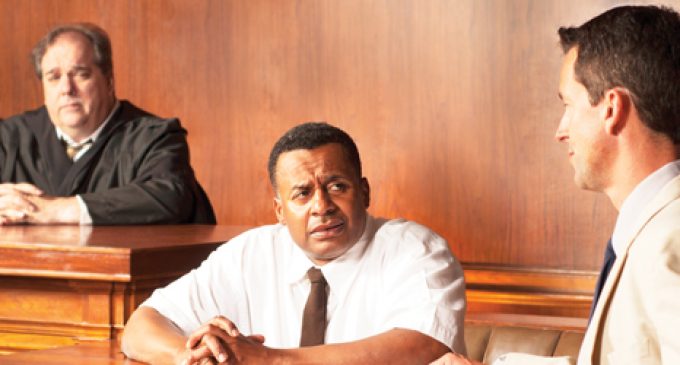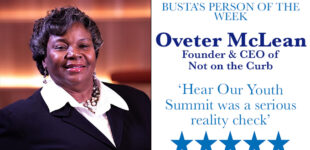‘A Time to Kill’ sparks discussion of race and justice

(pictured above: Derrick Parker (left) and Brain Joyce on stage in ‘A Time to Kill.’)
“Do you think we live in a country where the color of one’s skin determines the quality, or the type of justice?”
That was a question posed by Aaron Singleton as he moderated Twin City Stage’s “Balancing the Scales: A Community Forum on How Justice Works in Today’s America” on Sunday, Nov. 9. A panel of locals tackled that question and many more like it after a matinee staging of “A Time to Kill.” The play, which TCS presented earlier this month, is based on the 1989 John Grisham novel that revolves around the issues of race and justice that are raised when a black man, Carl Lee Hailey, murders two white men after they were exonerated for raping his daughter. The book has also made it to the big screen. The 1996 blockbuster starred Samuel L. Jackson, Matthew McConaughey and Sandra Bullock.
Though “A Time to Kill” is set in Mississippi, actor Derrick Parker, who played Carl Lee, said the issue of uneven justice is far-reaching and prevalent.
 “We have Emmett Till in 2014,” he said, referring to the real-life tragedy of the black teen killed by white men in Money, Miss. in 1955 who, like the characters in Grisham’s novel, were exonerated by an all-white jury. “So there are people who are not going to court having shot or killed someone and then getting off.”
“We have Emmett Till in 2014,” he said, referring to the real-life tragedy of the black teen killed by white men in Money, Miss. in 1955 who, like the characters in Grisham’s novel, were exonerated by an all-white jury. “So there are people who are not going to court having shot or killed someone and then getting off.”
Parker was joined on the panel by the play’s director, Mark Pirolo, and actor Brian Joyce, who played Carl Lee’s attorney, Jake Brigance. Real life attorney David Freedman, Highland Presbyterian Church Pastor Dr. Randy Harris and Dr. Alvin Mitchell, associate professor and coordinator of Justice Studies at Winston-Salem State University, were also panelists. (Singleton is also a WSSU employee, currently serving as director of News and Media Relations.)
Mitchell and Harris said the act of avenging is as old as mankind. Historically, acts of vengeance for wrongdoing used to fall to the oldest male in a family. The practice, Mitchell said, was known for creating bloody feuds between families that stretched for generations. He said modern societies put retribution in the hands of law enforcers. But that, too, has created problems when the system is seen to have failed, Mitchell said.
Harris pointed out that the famous “eye for an eye” verse in the Bible, which is often associated with vengeance, is actually a call for only using reprisals that are proportionate to the offending act. He said that man has always had a problem with finding the appropriate level of retribution.
“We can’t look back at a time when all was well and right in the world because from ancient times until now, the system is broken,” he said.
Freedman said he sees that broken system regularly in courtrooms.
“I can’t say I was morally opposed to the death penalty, but the more cases I’ve seen, the more absurd it is,” he said. “It’s a complete waste of time and money. It’s unfairly administered and the justification I hear from prosecutors is the concept of revenge.”
Freedman also critiqued drug laws, which are more harsh for crack offenses that minorities are often charged with than for cocaine, a drug more likely to land whites in the criminal justice system. Freedman said the harsher sentences for crack is one of the many factors for the disproportionate amount of minorities in prison.
“Even more dangerous than the ‘three strikes you’re out’ law is the mandatory drug minimums that got instituted back in the late ‘80s, and all of Congress believed that crack was Ebola at that time, even though there was no chemical difference between crack and cocaine,” he said.
The audience was actively engaged in the conversation, sharing their own frustrations with everything from the media and education system to the societal stereotypes they said contribute to inequalities.
Yancy Parker, the brother of actor Derrick Parker, traveled with his family from Charlotte to see the play and listen to the panel discussion. He described the warnings he gives to his son to keep him safe in a society that views black men with suspicion. He has told him not to take a bag into a store and to always keep the receipt after buying something to prevent accusations of theft. He told him if he’s ever followed in a store, to just go about his business and don’t be confrontational. Parker said black parents everywhere share such lessons with their kids.
Panelists did see hope for improvements in judicial inequality. Freedman said the nation seems to be relaxing its attitude on harsh punishment for drugs. He cited the legalization of marijuana in several states as evidence. Mandatory sentencing is also slowly fading away, said Freedman, who is also encouraged by the increasing number of African-American lawyers and judges.
















